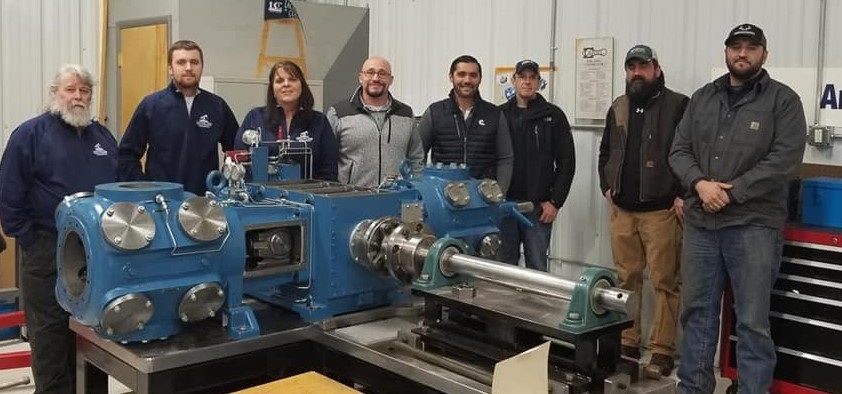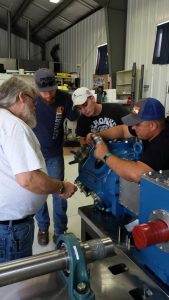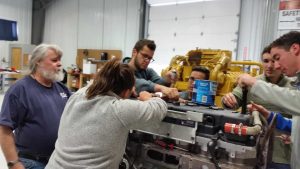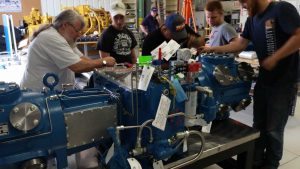Recently meeting at the school to discuss the new mechanics certification program were (top, from left) LC PNG administrators David Decker, Joshua Roe, and Sue Gumble, and PNG Advisory Board members Joe Guastella of Williams, B.J. Kline of Cabot, Bill White of Williams, Dustin Holl of SWN, and Ben Whitaker of Cabot. Above, LC PNG manager of the Compressor/Engine Program David Decker (in white shirt) works with students in the lab on a compressor.
The Lackawanna College School of Petroleum & Natural Gas (LC PNG) in New Milford will offer new courses in Fall 2020 designed specifically to certify a new league of compressor and engine mechanics to work in the gas- and oilfields. The courses are elective to degree-seeking students but can also be taken separately from the two-year program for the Petroleum & Natural Gas Technology degree.
“Some students really want to get their hands dirty and don’t embrace the academic aspects of the current program,” Sue Gumble, LC PNG program director explained. “This will give them more choices and greater flexibility with their education.”
As the technology of the natural gas industry continues to evolve, the needs for employees with specialized skills continues to change. Gas industry leaders in the Marcellus shale region of northeast Pennsylvania are conveying those needs to administrators of the school to assist them in better preparing a job-ready workforce.
According to Gumble, an advisory board of school administrators and representatives from Cabot, Chesapeake, SWN, Williams, and Repsol – all major companies operating in the area – was formed in January for the purpose of guiding curriculum at the school. One of several necessities on which members of the board immediately agreed was that for more mechanics.
Compressors are now being installed on gas pads for a number of technical reasons, including providing an artificial lift for wells that are getting older and losing pressure. They will feed into the larger compressor stations, Dave Decker, PNG manager for the Compressor & Engine Program related. “A lot of companies were using repair crews or subcontractors, and that’s expensive,” he noted.
“They want to be able to do this internally,” Gumble added. “They need certified, qualified people to maintain the compressors on-site.”
Instructor to student ratio for the mechanics courses will average 10 to 1, and there will be more lab time than classroom lectures. “The new course is more vocational – much more hands-on,” Decker explained. “They will learn by touching, feeling and seeing.”
Each student will maintain a log book covering all of the aspects of disassembly and reassembly of engines and compressors. The instructor will sign off on each element as it is mastered. “It holds them accountable for every step, including troubleshooting, which is one of the primary skills we want them to develop,” Decker offered. The lectures, while shorter than those for the current Intro to Compression and Intro to Engines classes, will focus on that day’s lab activity and will stress safety measures relevant to the task.
Because the certification for mechanics can also be obtained separately from the degree program and in the course of just two semesters, a number of local companies are already planning to send current employees to the school to increase their skill sets for the gas pads.
More changes are coming down the pike for LC PNG as advisory board members recommend increasing the number and size of labs. “The industry feels that’s how they learn,” said Gumble. The board will help the school solicit materials support from area businesses including new compressors to work on and additional components. DeNaples Auto Parts has already donated four engines to the school.
By keeping the school apprised of changes in the industry, the advisory board has taken the lead in closing employment gaps. Future courses in instrumentation and process control are in the works, as well as introductory classes for petrochemical production, a field that is experiencing a high retirement rate without new employees to fill the positions.
Industry leaders and educators in other parts of the country are watching LC PNG closely. Gumble recently returned from a visit to the Illinois Basin, an oil reserve covering 59,000 miles of Illinois, Indiana and Kentucky. “They don’t have schools like this there,” Gumble related. “They want our students, and they want to send their people here for both the degree and certification programs that are offered.” There was also a keen interest in the PNG Tech degree program that the school offers online.
As enrollment at LC PNG continues to climb, affirmed by a record number of mid term entrants this year, more people are also taking advantage of online courses, which can prepare students for quicker graduation and entry to the work force. The advisory board has also asked the school to consider internships during winter break, when the stress of colder weather causes more of the problems to equipment that the students need to understand.
To learn more about the new programs at LC PNG, log on to www.lackawanna.edu or call at 570-465-2344. An open house is planned at the school on Saturday, March 28, and interested readers can arrange for visits on other specific dates.




Give us a call we would enjoy talking to you about all the different programs that Lackawanna PNG offers!